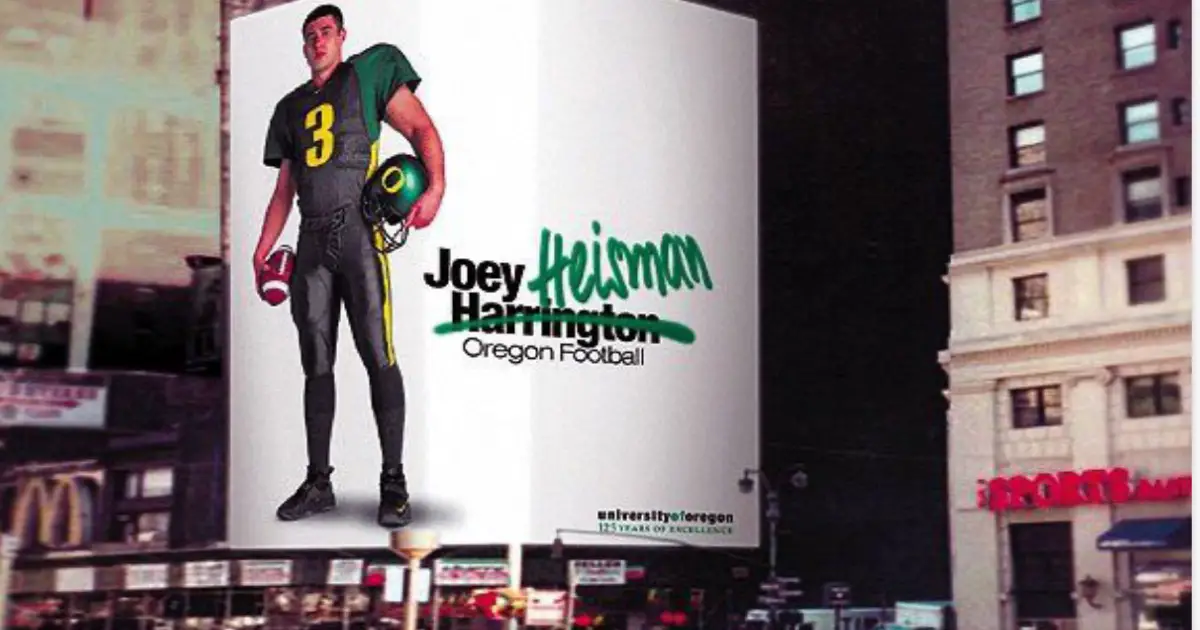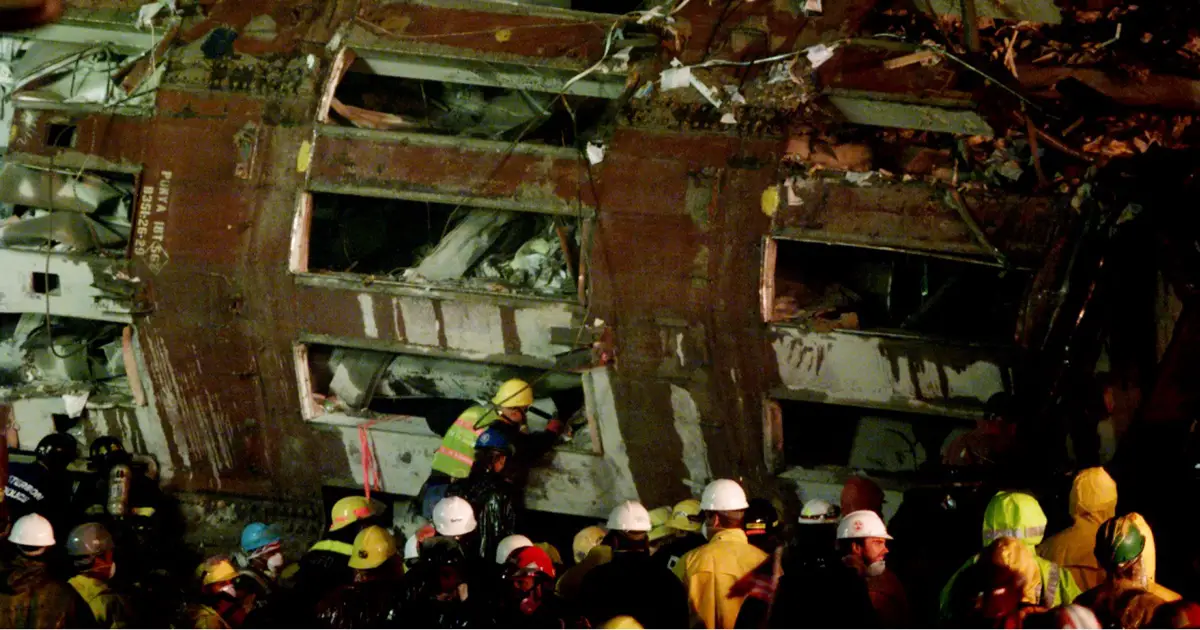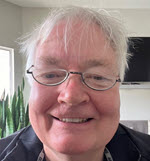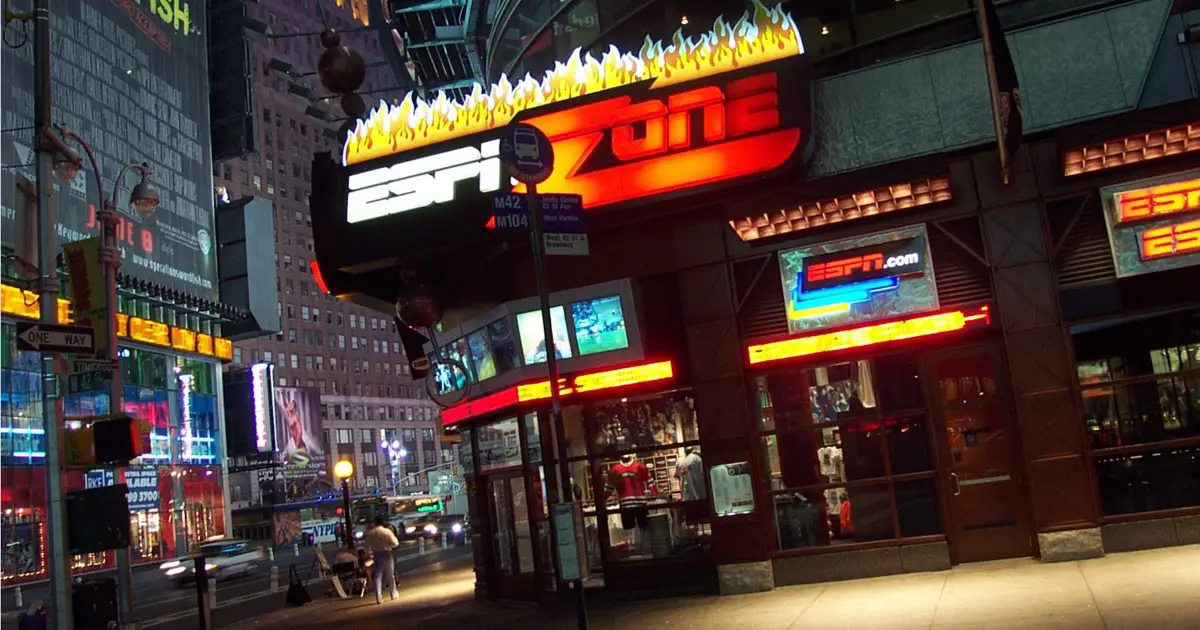The howling and post mortem accusations have ripped around for 72 hours. In times like these I go another way, pulling out a memory I’ve fixed in amber and consulted many times over the last two decades. Here’s the story.
I had held a ticket to Oregon’s home game against USC in 2001, planning to fly to Eugene from my home in Los Angeles. Instead, 9/11 happened, and my LA newspaper sent me to New York to manage 33 reporters and photographers dispatched to cover the aftermath.
New York City, sometime after 1 a.m., Sunday Sept. 23, 2001.
A half-dozen Oregon fans stare at a tall screen in a big, dark and otherwise empty room on Times Square. We are locked inside the ESPN Zone sports cathedral, just a dozen blocks away from a 10-story poster of quarterback Joey Harrington gracing a New York office building. The poster is part of Oregon’s Heisman campaign for Harrington and is the source of much pride for an emerging football program. Joey Harrington 10 stories tall in New York Damned City! Oregon football has arrived.

Joey Harrington poster in midtown Manhattan, circa 2001.
The Kindness of Strangers
On this night we Oregon fans are blissfully removed from the city around us as it reels from the attacks 12 days earlier. We are cocooned and captivated by a game 3000 miles away. The game started at 10:15 Eastern time and as the hours passed, one by one games on ESPN’s two-story wall of screens wrap up, monitors blink off and fans leave. Now only the Oregon game remains – and last call has emptied the place.
As the doors close, the Ducks cling to an eight-point lead starting the 4th quarter. We wait to be tossed out. Instead, a bartender makes a gesture big as a 10-story poster. “You can stay,” he says.
With busboys and waiters cleaning up for the night, he switches the game to the enormous main screen. We kick back in recliner seats and watch a fourth quarter that becomes an ordeal. The Trojans fight back, scoring a touchdown and then a field goal to take a one-point lead with less than five minutes remaining.
As time runs down, Oregon methodically moves into field goal range. With 97 seconds remaining, kicker Jared Siegel lines up for a game winning field goal — and USC blocks it. Resigned to losing, we walk around looking for someone to let us out. The place is empty. All the staff has gone home.
Turning back to the screen, we are astonished to see coach Mike Bellotti’s crisp clock management earn one last chance. Oregon gets the ball on its own 24 yard line with just 56 seconds remaining. Enter Captain Comeback. Harrington completes five passes covering 61 yards in just 40 seconds. Siegel then boots as beautiful a field goal as ever there has been in the history of legs.
We erupt in cheers and high-fives — and the bartender magically reappears. He’d waited in an office to let us out. My newspaper had given me 200 $50 bills for staff incidentals. He gets one of them.

The hunt for survivors after 9/11. The late Los Angeles Times photographer Gary Friedman gave me a copy of this photo from our last assignment together.
More Strangers, More Kindnesses
Arriving at my hotel, floating from the win and foolishly hoping for a celebratory scotch, I duck into the lobby bar. It’s closed but a fireman sits in a corner, an arm around one of our reporters. She is a mess, crying. She arrived along with other staff reinforcements the day before and asked if she could go to the recovery zone, even though her assignment was to cover things outside it.
I made a mistake and said yes. She went, saw exhausted workers hauling out plastic buckets of remains, and lost it. Now, 15 hours later, she hasn’t recovered.
Jerked back to reality, I go to my room but can’t sleep. About 6 a.m., I grab a coffee and walk 23 blocks down an utterly deserted Park Avenue to our New York bureau, where I find our four photographers napping on a couch and on the floor, heads resting on jackets over bags of photo equipment. We have been there for nine days and the photographers have yet to check into our hotel. They have been taking photos, napping, taking photos, napping.
On a Saturday night weeks later, I take our large crew to dinner at the Mesa Grill to thank them for their work. Delayed by breaking news, we arrive two hours past our reservation. The kitchen has just closed. But instead of sending us away, the staff reopens the kitchen and invites us to a large group of tables they have pushed together. We order as the restaurant closes around us. We have the place to ourselves (except for actor Peter O’Toole, nestled in a corner, in his cups, with a fetching lass).
As we finish eating, the restaurant manager comes to the table. He says he will comp the meal.
Why?
Because you guys came all this way to write about New York. (For the record, we paid the bill and added a clutch of those fifties as a tip.)
A month later, on the way to Penn Station and a train to Washington DC, I ask the cabbie to swing by the Harrington poster for a last look. It is grimy and worn—and now seems wildly out of sync.
What seems more important about those months in New York, during that football season from afar, was the graciousness of people coping with a horror and how their spirit served as a reminder that college football is a wonderful diversion and a most excellent game. But it is just a game.
Drex Heikes
Los Angeles, California
Top photo by FreeImages.com/danskii
 Bob Rodes, the FishDuck.com Volunteer editor for this article, is an IT analyst, software developer and amateur classical pianist in Manchester, Tennessee.
Bob Rodes, the FishDuck.com Volunteer editor for this article, is an IT analyst, software developer and amateur classical pianist in Manchester, Tennessee.

Drex came to Oregon from the Alaska bush at a time that Dan Fouts, Ahmad Rashad and future New York Giant great George Martin (a freshman dorm mate) roamed Autzen. He was Emerald editor-in-chief before going on to a 44-year career at newspapers in New York, Alaska, Nevada and California. He spent half of his career at the Los Angeles Times, including stints in New York and Washington D.C. bureaus, where he was foreign affairs editor.
Drex worked in news, not sports, but did occasionally indulge his passion for football and once covered a tickertape parade for the New York Yankees. He directed investigative stories in 2008 that won the 2009 Pulitzer Prize gold medal for public service. He retired in Los Angeles but has a season seat at Autzen and flies up for most home games.


